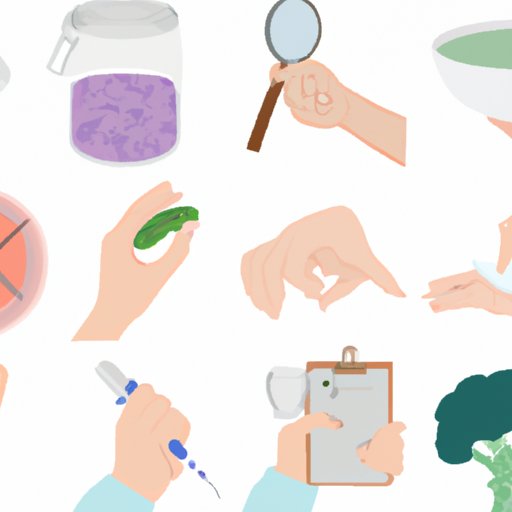
I. Introduction
Parasites are organisms that live in or on another organism, called the host, and harm the host to survive. Parasites come in all shapes and sizes, from tiny protozoa to larger worms, and can cause a range of health problems. While most people in developed countries might not expect to have parasites, they are a common issue worldwide.
Detecting and addressing parasite infections is important for maintaining overall health and well-being. If left untreated, parasites can cause serious and long-lasting damage to the body. In this article, we will explore how to identify the warning signs of a parasite infection, what types of parasites are most common, how to treat them, and what you can do to prevent future infections.
II. 10 Warning Signs That You Might Have Parasites
Parasite infections can cause a variety of symptoms. Some of the most common signs that you might have parasites include:
- Abdominal pain and cramping
- Diarrhea
- Constipation
- Bloating or gas
- Unexplained weight loss
- Fatigue
- Allergies
- Itching or rash
- Sleep disturbances
- Brain fog or difficulty concentrating
If you experience any of these symptoms, it’s worth seeing a doctor or healthcare provider to rule out a parasite infection. Some parasites can be asymptomatic, meaning they don’t cause any noticeable symptoms. However, even asymptomatic parasites can cause long-term damage to the body over time, so it’s important to get tested if you’re at risk.
III. The Different Types of Parasites and Their Tell-Tale Symptoms
There are several types of parasites that commonly infect humans. Some of the most common parasites include:
- Tapeworms
- Roundworms
- Hookworms
- Giardia
- Pinworms
- Toxoplasma
- Trichomonas
- Entamoeba histolytica
- Cryptosporidium
- Fasciolopsis buski
The symptoms of a parasitic infection depend on the type of parasite. For example, tapeworms can cause abdominal pain, weight loss, and digestive issues, while giardia can cause diarrhea, gas, and bloating. Pinworms can cause itching around the anus, while toxoplasma can cause flu-like symptoms.
IV. What to Do If You Suspect You Have Parasites: A Step-by-Step Guide
If you suspect that you have a parasite infection, it’s important to take action right away. Here are the steps to take:
- See a healthcare provider. They can recommend tests and prescribe medications.
- Get tested. Your doctor may order a stool test or blood test to determine what type of parasite you have.
- Follow treatment. Depending on the parasite, your doctor may prescribe antibiotics, antiparasitic medications, or other treatments.
- Take precautions to prevent future infections. This may include washing your hands frequently, avoiding undercooked meat or contaminated water, and practicing good hygiene in general.
V. The Link Between Parasites and Gut Health: What You Need to Know
The gut microbiome is a complex system of microorganisms that live in the human digestive tract. These microorganisms play a crucial role in maintaining overall health and keeping the immune system strong. When the gut microbiome is disrupted by a parasite infection, it can lead to a range of health problems, including inflammatory bowel disease, autoimmune disorders, and even mental health issues such as anxiety and depression. It’s important to take measures to eliminate parasites and restore gut health when necessary.
VI. The Top Foods and Supplements That Can Help Eliminate Parasites
There are several foods and supplements that can help eliminate parasites and restore gut health. Some of the most effective options include:
- Garlic
- Pumpkin seeds
- Cloves
- Ginger
- Probiotics
- Apple cider vinegar
- Grapefruit seed extract
- Black walnut hulls
It’s important to note that while these remedies may be helpful, they are not a substitute for medical treatment. Always consult with a healthcare provider before using any supplements or alternative treatments for a parasite infection.
VII. Parasites in Humans: Myths vs. Facts
There are many myths and misconceptions surrounding parasite infections in humans. Here are some common myths, along with the facts:
- Myth: Parasites only affect people in developing countries.
- Fact: Parasites can affect anyone, regardless of where they live.
- Myth: Parasites are rare in developed countries.
- Fact: While some types of parasites are more common in developing countries, they can still be found in developed countries.
- Myth: Parasites are only found in unclean environments.
- Fact: While poor hygiene can increase the risk of parasite infection, parasites can also be found in clean environments.
- Myth: Parasites only infect the digestive tract.
- Fact: Parasites can infect many different parts of the body, including the brain, lungs, liver, and muscles.
- Myth: All parasites are harmful.
- Fact: While many parasites can cause harm, some types of parasites may actually be beneficial to the body.
VIII. Why Parasite Cleanse Is More Than Just a Trend and How to Do It Safely
Parasite cleansing has become a popular health trend in recent years, but it’s important to approach it with caution. While some forms of parasite cleansing can be effective, others may be dangerous or ineffective. When considering a parasite cleanse, it’s important to:
- Consult with a healthcare provider
- Choose a safe and reputable cleanse program or supplement
- Follow the instructions carefully
- Monitor for any adverse reactions
- Take steps to prevent future infections
IX. Conclusion
Parasite infections can cause a range of health problems, but with the right treatment and prevention strategies, they can be managed effectively. If you suspect that you have a parasitic infection, it’s important to seek medical attention right away. By taking steps to eliminate parasites and restore gut health, you can improve your overall health and well-being.
Remember to always consult with a healthcare provider before using any supplements or alternative treatments for a parasite infection, and to take precautions to prevent future infections.




